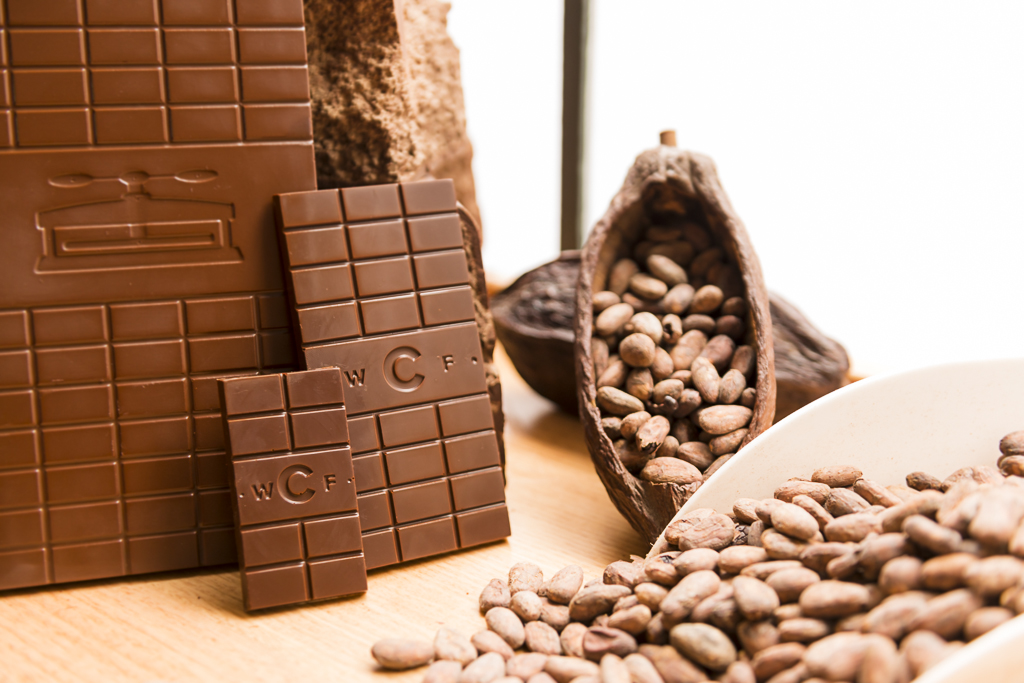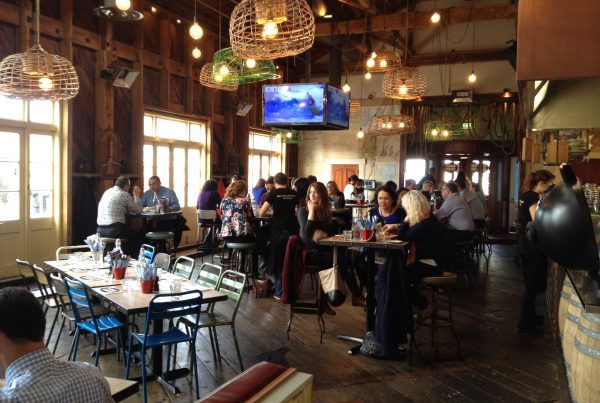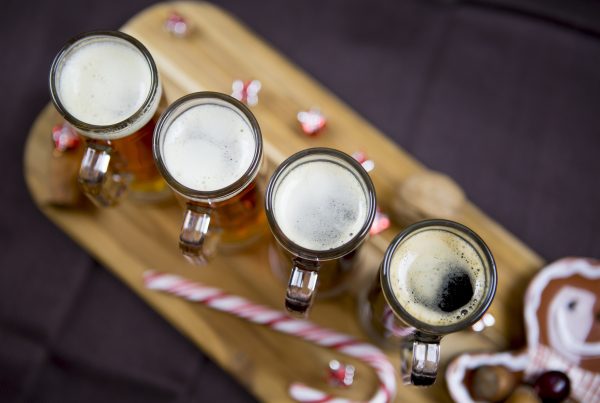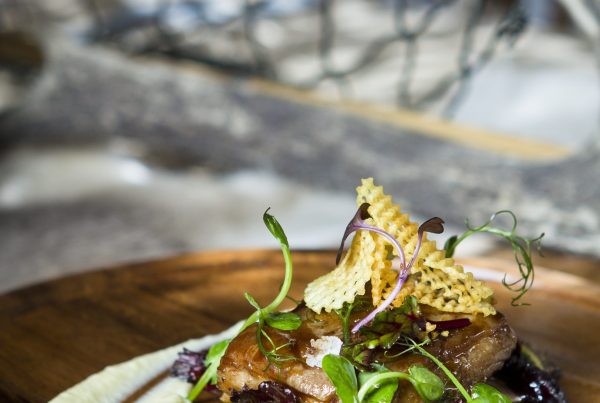
Wellington has always been a haven for foodies, pioneering the café revolution in the late 1980s — thanks Havana — and recently, in the Al Brown era, embracing the concept that top-quality ingredients are the kingmaker in any culinary delight. Gastronomic institutions like Moore Wilson’s have been integral in promoting the local scene and the simple premise that fresh is best.
FishHead have chosen four local enterprises that showcase this spirit and vitality, and sent Brock Oliver and photographer Matt Evans to document the exciting new buzz.
Big Bad Wolf Charcuterie
The Wolf of Wakefield Street
Entering the Big Bad Wolf premises, I am greeted by a tongue-in-cheek hand-sketched message painted on the wall: “WARNING: Our products may contain… Pork, Alpaca, Tahr, Goose, Snails, Rabbit, Pork, Veal, Venison, Clams, Beef, Ostrich, Lamb, Paua, Pork, Duck, Salmon, Pork…”, undoubtedly the broadest catchment of game meat you’ll ever come across, with an obvious emphasis on the humble pig.
Big Bad Wolf is a charcuterie — an establishment specialising in the art of salting, smoking and curing. At its core are wild game and happy pigs, which with an alchemy of classic traditions and Kiwi fusion are piped into sausages, finely sliced as prosciutto, or refined into terrine. When the ingredients are this good, the possibilities are truly free-range.
Gabriel Hall and head chef Manni Hunt established Big Bad Wolf in October 2012, both having previously owned restaurants in Wellington (Hall had Boulot on Blair Street, while Hunt had owned Eateria de Manon in Newtown). The transition from restaurateurs to charcuterie was a wild swing into the front line of animal life, visiting farms and embracing the terrain of the inhabitants.
After a nifty espresso and chat with Hall, it is obvious that a lot of the enthusiasm about BBW lies in the local catchment of each animal brought into the premises. With pork at the heart of the business — 12 pigs per week are roasted on site — it is essential to get nose down among some facts.
After a fact-finding and sourcing mission at the Soggy Bottom piggery in Ngaruawahia, Hall and Hunt settled on a supplier in Otaki, an idyll of piggy lifestyle where chubby wobblers graze happily in an apple and pear orchard.
“I’ve been to a few piggeries now and the usual behaviour for them is to go nuts when you step in their yard — because they think you’re going to feed them — but these pigs are so placid, they amble around the orchard, and when they’re a little peckish they whack a tree with their rump, wait for the fruit to fall (including chestnuts and avocado when in season) and lazily graze.”
All the animals are butchered on site, nose to tail, and all the body parts are used — including the organs, which are used in pâté and terrine products.
“The alpaca are from the Hawke’s Bay, wandering and grazing on coastline cliff tops. Goat, wild hare, rabbit, tahr [Himalayan mountain goat] all live in the alpine grasslands and foothills of the Southern Alps and are certified in Blenheim.”
In a weird twist of colonisation, it is evident that local really is best when it comes to ecology and sustainability, as Hall elaborates: “The tahr are ironically nearly extinct in the Himalayas, but are plentiful in the Alps, where they were introduced for hunting in 1904. Now they’re a bit of a pest, especially damaging to the native alpine vegetation.”
The back story to every animal that enters the premises not only adds a depth of flavour, but also a strong visual image of wild beasts roaming free over the hills. That is certainly not something you feel as you stand in line at your local supermarket.
Established: 2012
Motto: All the better to tempt you with
Selling point: A mix of old-world tradition and new-world techniques
Drinks match: A bold Otago Shiraz or earthy Hawke’s Bay Syrah[/danger]
Zelati Gelato and Sorbet
Cream of the Crop
An alley tucked off Tawa’s Main Road is an unlikely place to find a gourmet artisan gelato and sorbet factory, but on an unusually hot Wellington day it all makes perfect sense. Founder Alberto Tuason is all about creating the ultimate indulgence with as little guilt as possible. In a city where other boutique gelato makers — Gellissimo and Kaffee Eis — already have a strong foothold, it takes a brave man to enter this niche market. The strength of Zelati is their very Kiwi approach to fusion — a detail that adds a real flair to the brand and Tuason’s extremely high standards in sourcing the best fruit and natural flavourings.
Tuason is a self-confessed foodie and chocolate addict who grew up in a family of restaurateurs in Manila in the Philippines. While he has spent most of the last two decades working in IT, he has found time to attend to his sweet tooth by completing a chocolatier diploma in Melbourne and is a certified maestro gelatiere/sorbetiere graduate of the Carpigiani Gelato University — the training institute of the Carpigiani company in Bologna, founded in 1944 by brothers Poerio Carlo and Bruto Carpigiani, pioneers and maintainers of the gold standard of gelato making. Tuason has seven certificates from the Gelato University, including in the health side of the artform (such as allergies).
Tuason arrived in New Zealand in 1994 with his wife Rose, and continued to work in the IT industry while still harbouring dreams of setting up his own café. He opened the Zelati factory and retail space last year — a truly family affair, with his three daughters involved in helping set up the business.
“Part of the inspiration to pursue gelato and sorbet (rather than ice cream) was due to my cholesterol levels being quite high, so I went for this healthier form of sweet indulgence. My youngest daughter, Faith, is also lactose-intolerant, so that was a motivating factor in developing the sorbet line. I develop all the recipes, with my family as willing guinea pigs!”
Tuason finds the Kiwi food scene inspiring and supportive, and is vigilant in his pursuit of creating a truly gourmet product. Most importantly, he avoids using a ‘pre-mix’ base to create his gelato, an oft-used short cut in the process. He sources as much fruit as possible from New Zealand — mainly from Hawke’s Bay — with pineapples from the Philippines, bananas from Ecuador, Magdalena mangoes from Colombia, vanilla from Tahiti and raspberries from Chile. His chocolate is a high-quality 70 percent-cocoa-based Guyana product made in Belgium, and the starting point for his gelato is Zany Zeus organic milk.
According to Tuason, Zelati’s latest signature flavour — and their most unique fusion so far — is plum and pineapple, a wonderful marriage of the super-sweet and the slightly tart. After a conservative tasting session of the whole gelato and sorbet range — 13 flavours in total — it is striking how clean and refreshing each flavour is, delicately balanced with a reliance on actual fruit for the majority of the sugar content.
While Zelati is less than a year old, their products are already available in Moore Wilson’s, selected New World supermarkets in the Wellington region and Farro Fresh in Auckland. They also supply high-end delicatessens, cafés, restaurants and hotels.
Established: 2013
Motto: Indulgence without guilt
Selling point: Every aspect of the gelato/sorbet-making process occurs on site
Drinks match: An elegant glass of Pinot Grigio[/info]
Nuts About Peanut Butter
Fix and Fogg
Named after Detective Fix and Phileas Fogg from Jules Verne’s Around the World in Eighty Days, Fix and Fogg is an homage to the sense of adventure that Andrea and Roman Jewell have invested in their peanut butter enterprise.
The couple met while studying law in the UK — Andrea is from Cambridge, while Roman grew up in Devonport on Auckland’s North Shore — and returned to New Zealand to practise law and start a family. What started out as a home-kitchen obsession has turned into a small business that has gone gangbusters, with Roman quitting his day job lecturing to final-year law students at Victoria University. Unsurprisingly, many of his friends and family thought he was mad, but also admired the couple’s vision of turning a dream into an actual boutique trade.
“The reason we started this is that we saw that there was nobody out there making artisan peanut butter,” says Roman. “There is 90 percent less salt in Fix and Fogg than other comparable brands. All the nuts added to make the super-crunchy variety are hand-ground and spooled by hand into jars. It is a very simple process, but it is time-consuming. The high quality of our product is due to taking care, every step of the way.”
After humble beginnings, working out of the kitchen at the Hataitai Bowling Club, Fix and Fogg HQ is now a former butcher’s shop — Luigi’s — in Elsdon, Porirua, an exceptionally anonymous location where Roman spends his days in the front room of the building. It is a simple set-up, with large sacks of nuts stacked on one side and the bespoke grinder, jar-steriliser and other paraphernalia on the other. Roman can churn through 150 jars a day, turning the roasted nuts — which are sourced from north Queensland — into glossy peanut butter. Marlborough sea salt is sprinkled into the mixture, and for a crunchy batch he hand-grinds the nuts and carefully folds them in.
“One of the things that people are enjoying more and more is being able to have a dialogue with a product, picturing how it was made and the personalities behind it. Yesterday we went in the Wellington Chocolate Factory, and the experience you have from being in an open-plan factory and seeing how the product is made adds a real depth to the experience. We don’t have that kind of work space at the moment, but we’d love to in the future. With the Wellington food scene, people like to have a conversation about the food they’re eating, a story behind it — it’s a pretty sophisticated consumer base we’ve got here.
“I think the biggest challenge with this business is how to do it on a small commercial basis, to keep involved with every step of the process in a manageable way. It’s usually either a big boys’ game, or someone in their kitchen, grinding up nuts and selling them at the farmers’ market — which is how we started out. Ideally we’d love to grow into something similar to the Wellington Chocolate Factory; where they are ‘bean to bar’, we would be ‘nut to jar’.”
The beauty of Fix and Fogg’s peanut butter lies in the truly simple process — one that took a good dollop of Kiwi ingenuity to master, but with a stamp of quality control that will remain, no matter how much the boutique business blossoms. Keeping true to their Aro Valley roots, the couple sell their smooth and super-crunchy peanut butter at vintage shop The General Store, Aro Café and Moore Wilson’s. The humble peanut has never tasted so good!
Established: 2013
Motto: No short cuts or funny business
Selling point: Hand-ground with 90 percent less salt than most competitors
Drinks match: Keeping with the Aro Valley theme, a Garage Project Venusian Pale Ale[/warning]
The Wellington Chocolate Factory
Bean to Bar

Situated in a space on Eva Street that used to be the Hannah’s shoe factory in the 1930s is one of the most inspiring foodie fit-outs ever seen in Wellington city. When Rochelle Harrison and Gabriel Davidson joined forces to establish the Wellington Chocolate Factory in 2013, the dream of the ‘bean-to-bar’ chocolate experience became a reality with the factory opening its doors to the public in December last year.
They took great care over the open-plan experience, which allows customers to observe the process of chocolate making: roasting the cocoa beans; milling, grinding and tenderising them; then pouring the chocolate and setting the bars. Along the way, the couple took a few tips from the legendary Mast Brothers of Brooklyn, New York, both aesthetically and in the production process. The transparency of the bean-to-bar approach is enabled by large-pane windows, through which customers can see the roasters and the work area adjacent to the counter.
“It’s been fun to have a rabbit warren to play with and great to bring back that factory feel to this area,” says Harrison.
It took two months to set the factory up, with a lot of family help — Harrison’s father is a harp maker and joiner, while Davidson’s mother and aunt did all the white tiles that give the space a crisp and clean edge. “At the moment there’s a lot of gaffer tape and number eight wire holding a few things together, but we have two engineers working on solutions as the company expands — one of them is a ballistics expert. They’re as excited as we are about the burgeoning craft bar scene,” says Davidson.
Harrison’s experience was as a pastry chef and chocolate maker — her brand was the Cocoa Press. Davidson, meanwhile, was a coffee roaster with an obsession for chocolate, specifically top-quality drinking chocolate. He set up his first company, Mofo Deluxe, in Melbourne seven years ago. After a bean-to-bar-inspired trip to New York, he came back to Wellington and discovered the Cocoa Press on sale in Commonsense Organics. The couple joined forces, investing a chunk of money in the necessary equipment and creating the resources to produce 20 times more chocolate at their new premises.
“We focus on single-origin beans to showcase the subtle complexities from around the globe. The difference you taste is nothing we’ve done, but rather about stripping it back and paying attention to extract the inherent qualities in the beans themselves,” says Davidson. As part of the process, Davidson travelled to Peru to meet some of his farmers; other beans (all Fair Trade and organic) are sourced from Trinidad, the Dominican Republic and Madagascar, and each has its own nuances, much like wine and coffee. The couple’s bean broker — Gino — operates out of Portland, Oregon, sourcing the highest-quality beans for them. They hope to add a Pacific Rim aspect to their chocolatier portfolio, with a potential supplier in Papua New Guinea looking very likely in the near future.
The future is looking pretty sweet for the Wellington Chocolate Factory — do yourself a favour and visit their premises at 5 Eva Street, where you’ll experience way more than a mere chocolate craving. It’s a true craft and culinary experience.
Established: 2010 (with the factory itself opening in 2013)
Motto: Single-origin, 70 percent cocoa, bean to bar
Selling point: The perfect aesthetic treatment is given to each step of the process
Drinks match: At Golding’s Free Dive (14 Leeds Street), look out for a beer they are developing using chocolate nibs from WCF[/access]











